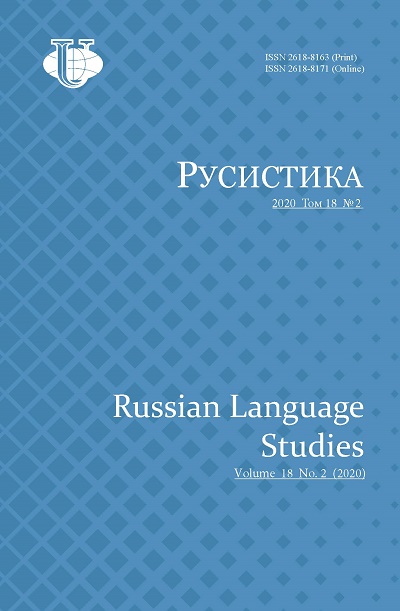Increasing motivation to learn Russian of children of compatriots abroad
- Authors: Drozdova O.E.1
-
Affiliations:
- Moscow Pedagogical State University
- Issue: Vol 18, No 2 (2020)
- Pages: 195-208
- Section: Methods of Teaching Russian as a Native and Foreign Language
- URL: https://journals.rudn.ru/russian-language-studies/article/view/23824
- DOI: https://doi.org/10.22363/2618-8163-2020-18-2-195-208
- ID: 23824
Cite item
Full Text
Abstract
Various aspects of teaching children of compatriots abroad are considered. These aspects can increase motivation to learn the Russian language and maintain their interest in the future. The relevance of the article is connected both with the needs of Russian-speaking compatriots and with a social request from the Russian Federation. The purpose of this study is to identify and summarize relevant and effective practices for teaching children the Russian language in the near and far abroad. The authors used the following research methods: analysis of scientific literature, observation and generalization of pedagogical experience. The theoretical significance of the study consists in analyzing facts from scientific sources and formulating some conceptual conclusions: for teachers and educators working abroad, it is necessary to form their students’ value-based attitude to the Russian language and a desire not only to communicate, but also to learn the world in the Russian language (simultaneously with learning the world in the language of the country of residence). The author also briefly presents the conceptual provisions of the developed new direction in the methodology - meta-subject teaching of the Russian language, gives recommendations on implementing this kind of training while teaching children of compatriots abroad. The analysis of specific types and forms of training aimed at increasing motivation for teaching the Russian language (including specific examples of working with teachers from Italy, Switzerland and Malta, kindergarten teachers from Oregon, USA) is of practical importance. The study proves the expediency of using the author’s recommendations to increase motivation for learning the Russian language: mastering the language in the process of learning different subjects and design and research linguistic activities in different areas of life.
Keywords
About the authors
Olga E. Drozdova
Moscow Pedagogical State University
Author for correspondence.
Email: o.e.drozdova@mail.ru
Doctor of Pedagogy, Chair of Laboratory of Interdisciplinary Philological Projects in Education, Associate Professor of Department of Teaching Methodology of the Russian Language
1 Malaya Pirogovskaya St, bldg. 1, Moscow, 119991, Russian FederationReferences
- Abramova, S.V. (2017). Russian classroom professional development course for teachers of Russian in Washington state. Russian language abroad. Special issue. Russian Studies of the USА. Retrieved January 6 2020 from https://journal-rla.pushkininstitute.ru/files/%D0%A1%D0%A8%D0%90_%D1%80%D0%B0%D0%B7%D0%B2%D0%BE%D1%80%D0%BE%D1%82%D1%8B.pdf (In Russ.)
- Barkan, A.I. (2009). Motivation or demotivation factors influenced studying of Russian at children from Russian speakers or mixed families, living abroad. Bulletin of Peoples’ Friendship University of Russia. Series: Problems of education: Languages and speciality, (4), 36–40. (In Russ.)
- Berdichevskii, A.L. (2009). Why do children of Russian compatriots abroad not want to learn Russian?: Speech at the World Congress of Compatriots Living Abroad. Retrieved January 6 2020 from http://bilingual-online.net/berdichevskijpochemudetisootechest vennikovnehotjatuchitjrusskij/
- Berdichevskii, A.L. (2012). Why do we need a weekend school for the children of Russian compatriots abroad? LiveJournal. Retrieved January 6 2020 from https://metodika-rki. livejournal.com/53264.html
- Berdichevskii, A.L., Nikitenko, Z.N., & Hamraeva, E.A. (2019). Methods of teaching Russian to bilingual children. Moscow: Bilingua Publ. (In Russ.)
- Deikina, A.D. (2013). Polyphony and harmony in the teaching of the Russian language. Problems of modern education, (3), 54–72. Retrieved January 6 2020 from http://pmedu.ru/ res/2013_1_7.pdf
- Drozdova, O.E. (2013). Linguistic conference of schoolchildren as a field for meta-subject teaching of the Russian language. Russian Language at school, (9), 3–8. (In Russ.)
- Drozdova, O.E. (2017). Metapredmetnyi podkhod k obucheniyu russkomu yazyku v raznykh predmetnykh oblastyakh shkol'nogo obrazovaniya [Metasubject approach to Russian lan- guage teaching in different subjects at school] (Doctoral dissertation, Moscow). (In Russ.)
- Drozdova, O.E. (2019). Axiological approach as a source of meta-subject teaching of the Russian language. Russian Language at school, (1), 3–9. (In Russ.)
- Khamraeva, E.A., Shorina, T.A., Samatova, L.M., Ryauzova, O.Yu., & Novikova, A.K. (2018). Linguodidactic diagnostics for Russian schools abroad. Saint Petersburg: Interuniversity Center of Bilingual and Multicultural Education of the Russian State Pedagogical University named after A.I. Herzen Publ. (In Russ.)
- Krivoborskaya, D.M. (2016). Motivation problems in the study of preschool and school age children of the Russian language as a foreign. Pedagogical Education in Russia, (12), 83–87. (In Russ.)
- Markova, A.K., Matis, T.A., & Orlov, A.B. (1990). Formirovanie motivatsii ucheniya [The formation of learning motivation]: book for teachers. Moscow: Prosveshchenie Publ. (In Russ.)
- Miller, A.L. (2006). Geographic speech: Elective course. Geography (no. 9). Retrieved January 6 2020 from http://geo.1september.ru/article.php?ID=200600913
- Ministry of Education and Science of the Russian Federation. (2011). Federalnyi gosudarstvennyi obrazovatelnyi standart osnovnogo obshchego obrazovaniya [Federal State Educational Standard of General Education]. Moscow: Prosveshchenie Publ. (In Russ.)
- Mustaioki, A., & Protassova, E. (2012). Russian language teaching in diaspora teachers’ reflection. The World of Russian Word, (2), 82–92. (In Russ.)
- Romanov, A.Yu. (2017). Russian language learning motivation among Russian heritage students in Colorado. Russian language abroad. Special issue. Russian Studies of the USA (pp. 51–57). Retrieved January 6 2020 from https://journal-rla.pushkininstitute.ru/files/%D0%A1%D0%A8%D0%90_%D1%80%D0%B0%D0%B7%D0%B2%D0%BE%D1%80%D0%BE%D1%82%D1%8B.pdf
- Kontseptsiya gosudarstvennoi podderzhki i prodvizheniya russkogo yazyka za rubezhom [The concept of state support and promotion of the Russian language abroad]. Retrieved January 6 2020 from http://kremlin.ru/acts/news/50644
- The language dimension in all subjects: A handbook for curriculum development and teacher training (2016). Retrieved January 6 2020 from https://rm.coe.int/a-handbook-forcurriculum-development-and-teacher-training-the-languag/16806af387
Supplementary files














